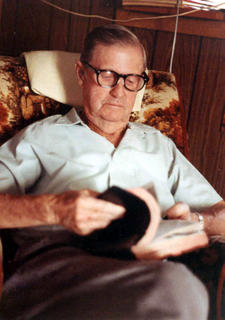When my sisters spoke of Grandaddy, they sometimes mentioned the hard times. They knew the stories about he and Dad that I had been shielded from--the stories that made Dad leave home. By the time I came along, his vigor was fading and the fire had dwindled. That's the way I remember him. Innocence and simpler times. When he died, Dad took me to the house and I went through his tools--the one thing I would most treasure and my cousins wouldn't desire. I know every tool in my toolbox and it's past. I know which ones came from his hands. I understand the marks on them and the stories they tell. I know his masonry hammer was sharpened on a grinder and the wheel ate into the handle. When I look at it, I always wonder if he did it, or some young carpenter sharpened it in haste...
When I use them, I feel connected to something bigger than me. I feel tied back to the hands of my fathers and I understand something within me. Those tools teach me about my own Dad and they teach me of his father and his father before him. They teach me why I love to work with my hands and how it came so naturally. My grandfather died in 1993. I had some time with him in the end. We talked about tools and such. He told me to get a hat that would cover my ears and he told Dad about the angel he saw. His hope in Christ carried through those last days. That hope carries my father and now it carries me. Our past winds back through time like a footpath in the woods--darting here and there through the trees. Few of us ever come to recognize the gift that it is and the story it will tell us if we quieten our hearts and walk along it's leaf strewn trail. I think God speaks to us through it--He tells us who we are.
